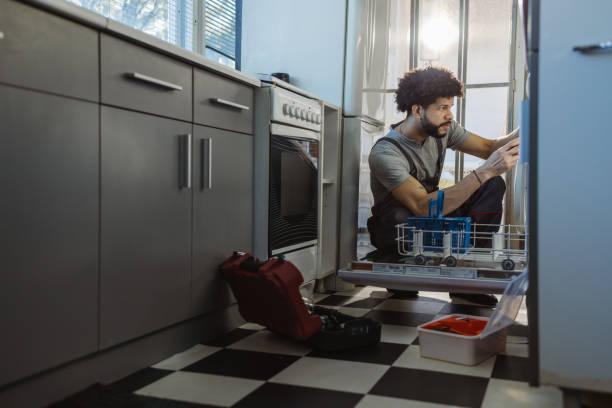Easy Appliance Repair: Learn How to Fix It Yourself

Appliance repair can feel overwhelming, but many common issues are fixable at home with the right guidance. Whether it’s a dishwasher that won’t drain or a refrigerator that’s not cooling, understanding basic appliance repair skills can save time and money. Knowing how to troubleshoot common problems, such as clogged drains, broken seals, or faulty wiring, can help prevent minor issues from turning into costly repairs.
Knowing the warning signs that indicate when an appliance repair requires professional help can make all the difference. A helpful guide on when to call a pro for appliance repair explains these key signals. This article will cover what appliance repair involves, why learning basic repair skills is beneficial, and how to safely handle simple fixes yourself.
What is Appliance Repair?
Appliance repair involves diagnosing and fixing issues with household machines like washers, dryers, ovens, refrigerators, and dishwashers. It can range from simple tasks like replacing a filter or cleaning a clogged drain to more complex repairs involving electrical or mechanical components. Understanding appliance repair basics helps you maintain your appliances’ performance and extend their lifespan.
Appliance repair empowers homeowners with cost-effective solutions to keep essential devices running smoothly. From troubleshooting common malfunctions to understanding when professional help is necessary, mastering basic repair skills enhances convenience and home efficiency.
Why Learn Appliance Repair?
Knowing how to perform basic appliance repairs saves money on service calls and reduces downtime. Many issues are caused by common, easy-to-fix problems such as clogged filters, loose connections, or worn-out parts. Besides cost savings, DIY repair can give you confidence and control over your home maintenance. However, it’s crucial to recognize when a repair is too complex or dangerous to attempt, to avoid further damage or injury.
How to Perform Easy Appliance Repairs
Starting with basic maintenance and small repairs can build your skills. Here are common DIY fixes:
-
Unclogging Drains and Filters: Regularly clean dishwasher filters and washing machine drains to prevent blockages.
-
Replacing Seals and Gaskets: Worn door seals in refrigerators and ovens can cause inefficiency; replacing them is often straightforward.
-
Resetting Circuit Breakers: Many appliances won’t operate if a breaker trips; resetting it can solve power issues.
-
Changing Light Bulbs and Fuses: Simple replacements can fix lighting or operational problems.
-
Checking and Replacing Hoses: Inspect water supply hoses for cracks or leaks and replace as needed.
-
Fixing a Jammed Garbage Disposal: If your disposal hums but doesn’t spin, it may be jammed. Turning off the power and using an Allen wrench to manually rotate the blades can often solve the issue.
- Cleaning Refrigerator Coils: Dirty condenser coils reduce efficiency and can overwork your fridge. Gently vacuuming or brushing the coils every few months helps maintain performance and prevent overheating.
Always unplug the appliance before attempting repairs and consult the user manual for specific safety instructions.
When to Call a Professional
While many repairs are manageable, some require expert intervention. If you notice persistent electrical issues, strange noises, leaks you can’t stop, or repeated malfunctions, it’s time to call a professional. For Clayton, NC residents and beyond, Complete Appliance Care offers expert service to handle complex problems safely and efficiently.
Tips for Preventing Appliance Problems
Regular maintenance is key to minimizing repair needs. Clean your appliances, check seals and hoses, avoid overloading machines, and follow manufacturer guidelines for use. Scheduled professional inspections can also catch issues early.
Conclusion
Learning basic appliance repair skills is practical and economical for homeowners. It allows quick fixes and extends the life of your machines while helping you decide when professional assistance is necessary. Remember, safety comes first—never hesitate to seek expert help when needed. Regular maintenance and early detection of issues can reduce breakdowns and improve energy efficiency. With time, even simple knowledge can build your confidence in handling everyday appliance problems.
FAQs
Q: Can I repair any appliance myself?
A: Basic repairs are often doable, but complex electrical or mechanical issues should be handled by professionals.
Q: How do I know if my appliance needs repair or replacement?
A: Frequent breakdowns, high repair costs, and poor performance might indicate it’s time to replace your appliance.
Q: What tools do I need for simple repairs?
A: Common tools include screwdrivers, pliers, wrenches, multimeters, and replacement parts like filters or seals.
Q: How often should I service my appliances?
A: Regularly clean and inspect appliances every few months; professional servicing once a year is recommended.
- Art
- Causes
- Best Offers
- Crafts
- Dance
- Drinks
- Film
- Fitness
- Food
- Spellen
- Festival
- Gardening
- Health
- Home
- Literature
- Music
- Networking
- Other
- Party
- Religion
- Shopping
- Sports
- Theater
- Wellness



